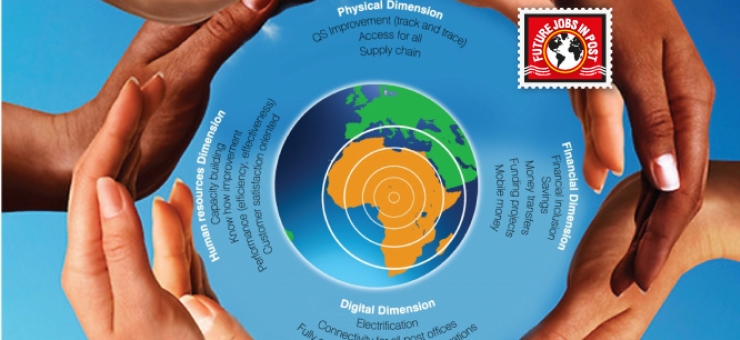Internet connectivity is top priority for Pan African Postal Union (PAPU) - Zimbabwe sets up electronic money transfers

In a January 18 press release, the Secretary General of the Pan African Postal Union (PAPU), Mr. Younouss Djibrine highlighted key development priorities for the postal sector in Africa up to the year 2016, top among them being electrification of post offices and internet connectivity.
Mr. Younouss said that the time when development of postal services was never on the list of national priorities was fading out as Governments increasingly realize that the postal sector was a critical partner in facilitating access to basic communications services to the greater majority of the people in rural areas.
Africa has the highest percentage post offices that are not connected to internet: this is set to change as the project aims to connect 80% of post offices in Africa with the internet by 2016. This will stimulate economic development, link rural communities and give them access to internet communication, including bank services.
PAPU celebrated the Pan African Post Day and its 34th anniversary on 18 January 2014 with a commitment to translating regional and global postal strategic plans into tangible gains. Created in 1980 in Arusha, Tanzania, the restricted union of the Universal Postal Union (UPU) has 43 members.
In his remarks during the opening ceremony of a joint PAPU and UPU meeting in February 2012, Tanzania’s Minister for Communication, Science and Technology, Professor Makame Mbarawa said ICTs had opened real opportunities for fast growth and sustainability of postal services, adding that customer satisfaction was equally important.
Making use of technology, Zimbabwe, for example, has improved its money transfer service:
Zipcash move into electronic money transfers earns Zimpost 300'000 USD
Zimpost reports it has earned 300'000 USD in the last quarter of 2013 thanks to the commissions on its new electronic money transfer service, Zipcash. This service was launched on October 21 2013 and enables nearly instant transfers from one post office to another in the country using codes, replacing the time-consuming old paper-based system.
Zimpost is working towards obtaining authorisations from central banks around the world to send and receive money internationally. People of Zimbabwe have been finding it difficult to send money out of the country in an efficient and affordable way, a move now supported by the Reserve Bank of Zimbabwe. The first countries where cooperation is either in place or being negotiated are South Africa, Tanzania, Botswana and Nigeria.
In an article published in The Herald, Zimpost general manager Mr Douglas Zimhango said the IFS system which the company will be using was developed by the Universal Postal Union, the mother body of all post offices in the world."This system has low operating costs compared to other money transfer agencies that operate in the world as post offices are meant for the people,” he said.
http://www.herald.co.zw/zimpost-unveils-zipcash/
The postal network in Zimbabwe has 222 outlets and many residents already have a postal savings account which means it will facilitate the immediate access to the service. Moving to an electronic platform is an important step both in servicing customers and in incorporating the use of ICT (information and communication technology) into Zimpost's operations. Where posts are not connected to the internet, cell phones will be used to conduct transactions.
These investments in technology are highly necessary in Zimbabwe, where traditional postal services have been replaced by modern transactions. They are expected to help revive the use of the postal network while providing new jobs in the sector.

